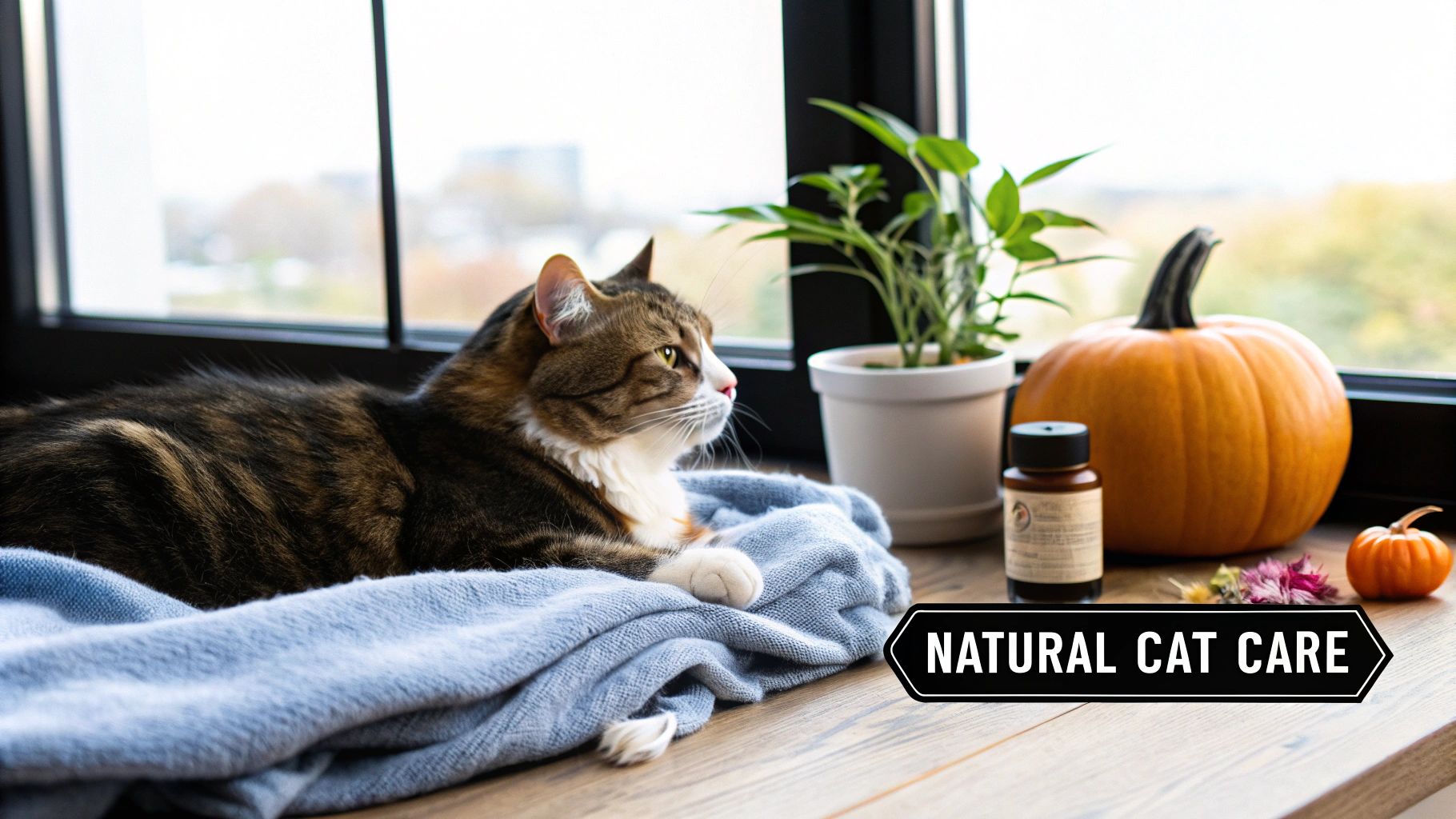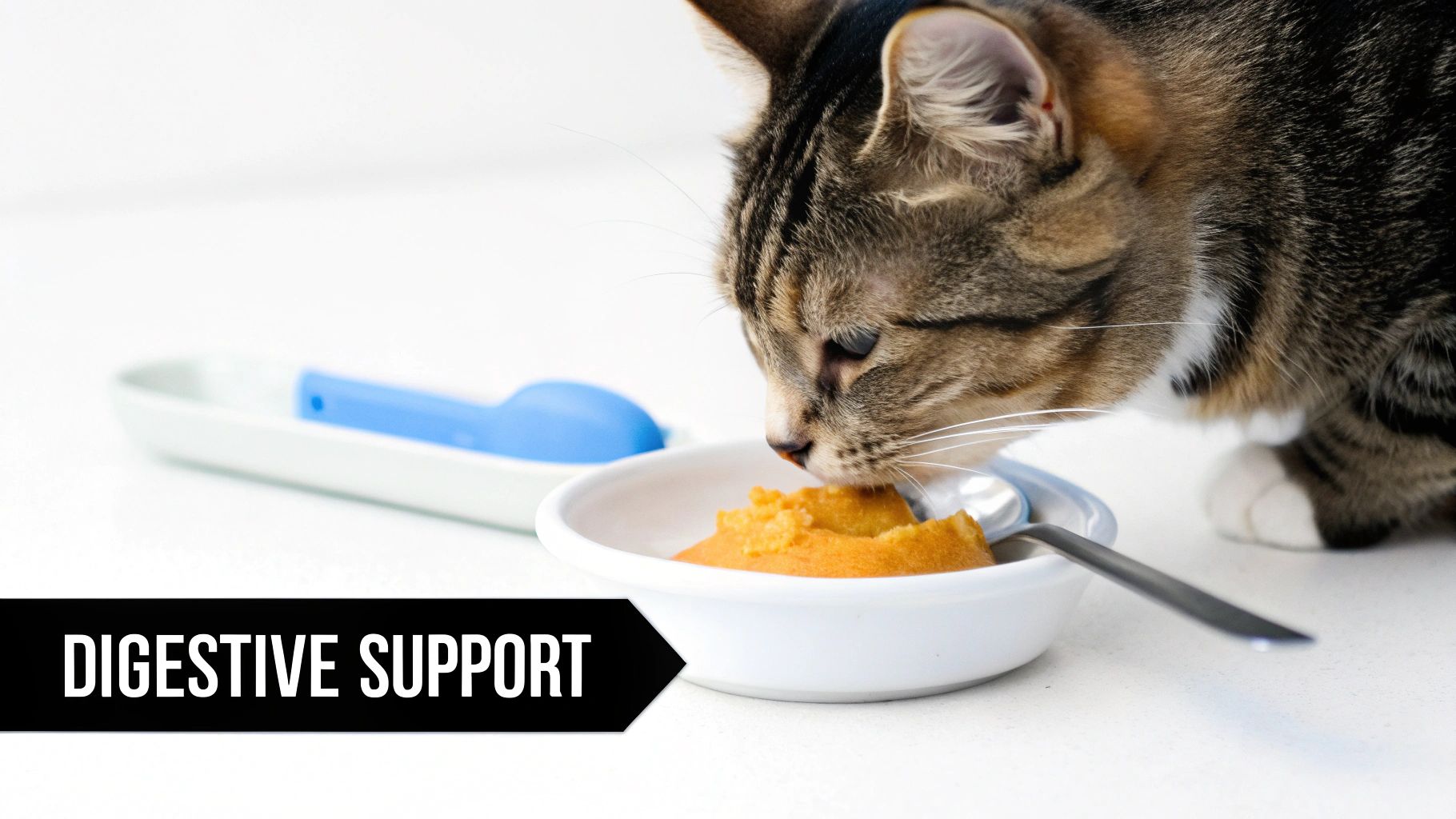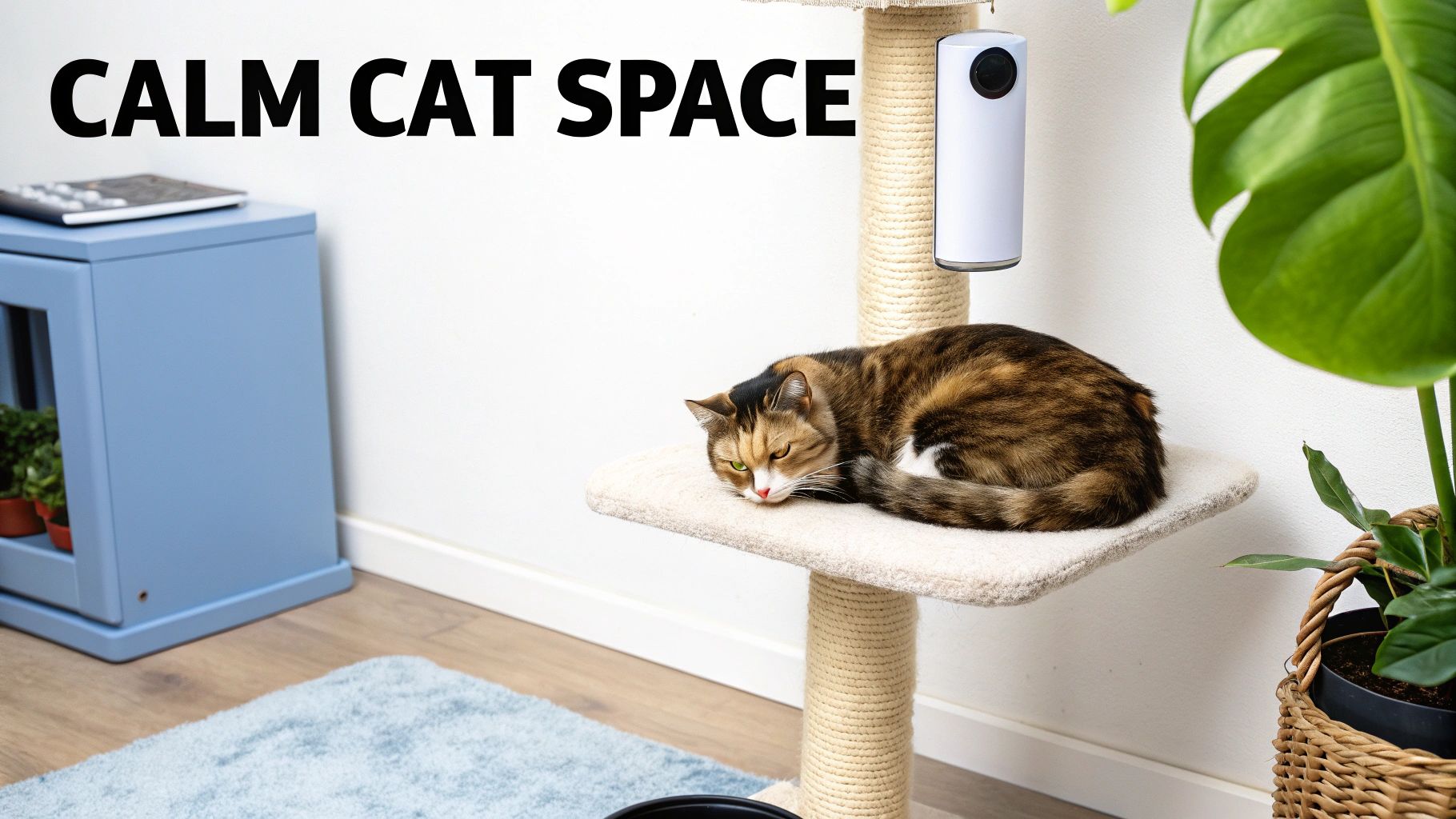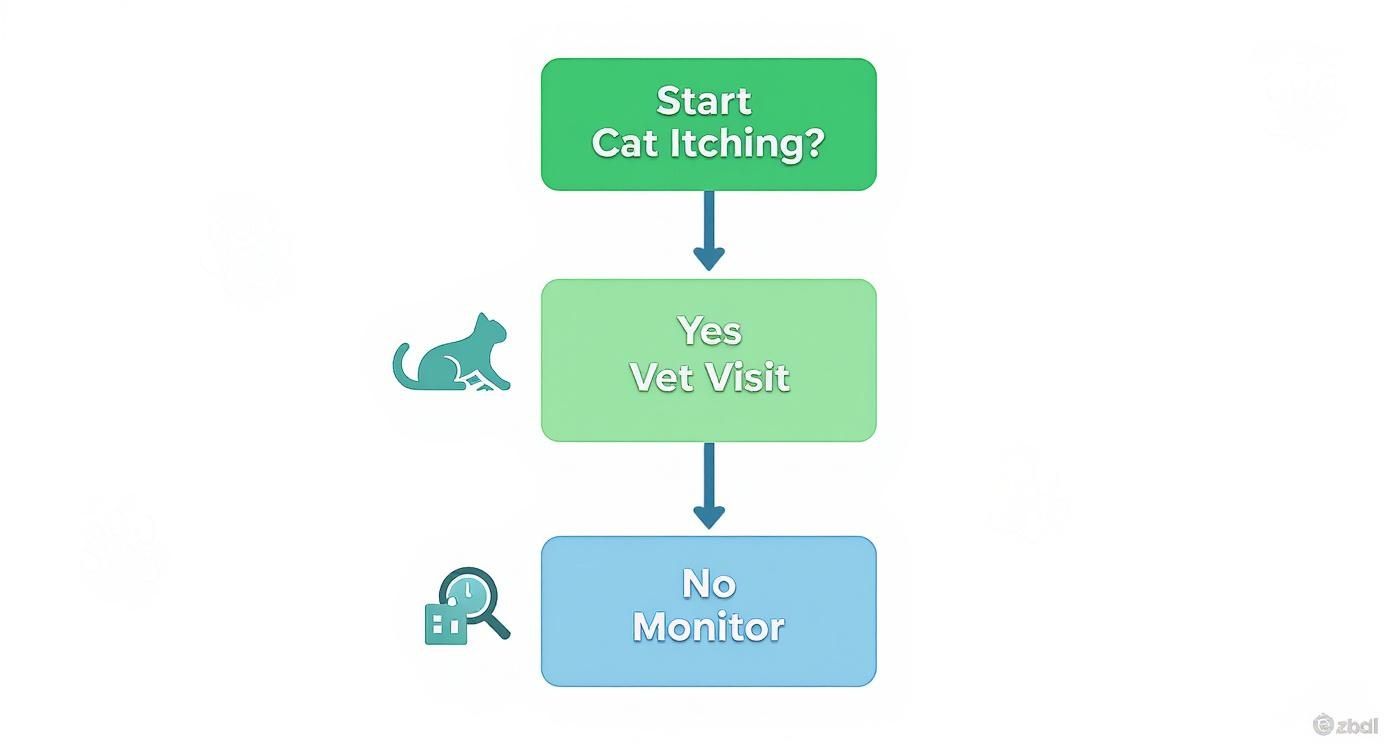
Natural Remedies for Cats A Vet-Approved Guide
Natural remedies can be a wonderful, gentle way to support your cat through common hiccups like a touch of anxiety, a mildly upset tummy, or itchy skin. The idea isn't to replace your veterinarian but to work alongside them, using things like plant-based supplements, thoughtful dietary changes, and a supportive home environment to boost your cat's overall well-being. Safety first, always.
Exploring Natural Remedies In Feline Wellness

Welcome to the practical side of holistic cat care, where we combine the best of modern veterinary science with time-tested natural support. This guide is all about giving you a vet-informed look at how to safely use natural options to help your cat thrive. We'll cut through the noise and focus on what actually works.
When we say "natural," we're talking about using ingredients and strategies that help the body do what it does best: heal and maintain balance. It's about adding more tools to your cat's wellness toolkit, not throwing out the ones your vet provides.
The Rise of Holistic Pet Care
It’s clear that more and more cat parents are looking for gentle, supportive options for their furry companions. You just have to look at the numbers—the global market for pet herbal supplements was valued at USD 1.07 billion and is expected to climb to nearly USD 2.96 billion by 2034.
This huge growth tells a story. People are actively seeking out chemical-free, natural products to help manage everyday feline issues. It’s all part of a larger shift toward a more complete, well-rounded approach to pet health.
What Is Integrative Medicine?
Think of integrative medicine as building a healthcare team for your cat. It’s an approach where traditional treatments (like prescription medications) and proven natural remedies work hand-in-hand. This teamwork creates a more flexible and personalized care plan.
For instance:
- A cat with arthritis might be on vet-prescribed pain medication, but also get daily Omega-3s to help support their joints.
- An anxious kitty might benefit from a special diet from their vet, while calming pheromone diffusers make their home feel safer.
The whole point of integrative care is to use every appropriate tool available—both conventional and alternative—to help your cat feel their absolute best. It’s about creating a bigger, smarter wellness strategy.
This balanced approach means your cat gets the powerful medical help they need for serious issues, while also enjoying the gentle, daily support of natural aids for comfort and well-being. You can learn more about complementary approaches by reading up on popular holistic therapies.
Of course, none of this works without a solid foundation, and that foundation is always nutrition. To get a better sense of how diet fits into this picture, you can check out some of the top natural pet food brands.
Before we dive deep into specific remedies, here’s a quick snapshot of the common issues we'll be covering and some of the natural tools that can help.
Common Feline Issues and Potential Natural Approaches
| Common Issue | Potential Natural Remedy | Key Benefit |
|---|---|---|
| Digestive Upset | Probiotics, Pumpkin, Slippery Elm | Soothes the gut, improves digestion |
| Anxiety & Stress | L-Theanine, Pheromones, Catnip | Promotes calmness and relaxation |
| Skin & Itching | Omega-3 Fatty Acids, Coconut Oil | Reduces inflammation, supports skin barrier |
| Hairballs | Psyllium Husk, Healthy Fats | Improves coat health, aids passage of hair |
| Minor Inflammation | Omega-3s, Turmeric (Curcumin) | Natural anti-inflammatory properties |
This table gives you a roadmap for what's to come. Now, let's get into the specifics for each of these areas, starting with how to safely support your cat's digestive health.
The Unbreakable Rules of Natural Feline Care
Before we get into specific remedies, we need to lay down some foundational, non-negotiable ground rules. This isn't just about being cautious; it's about keeping your cat safe. The absolute most important thing to burn into your memory is that cats are not small dogs or humans.
Their physiology is a world of its own. Think of your cat's liver as a highly specialized filter—it’s brilliant at some tasks but completely missing certain enzymes that other species use to break down compounds in plants and oils.
This is exactly why something as seemingly harmless as an essential oil can be deadly for a cat. Their system simply can't process and excrete it, which allows toxins to accumulate to dangerous, and sometimes fatal, levels.
Always Consult Your Veterinarian First
This is the golden rule. No exceptions. Before you even think about adding a new supplement, herb, or food to your cat’s routine, you must have a conversation with your vet. They have the full picture of your cat’s health history, including any hidden conditions or medications that could clash with a new remedy.
A quick chat with your vet can help you:
- Confirm What's Really Going On: What you see as mild anxiety might actually be a symptom of hyperthyroidism. That constant itching could be a food allergy or even parasites, not just dry skin.
- Avoid Dangerous Interactions: A natural supplement could easily interfere with a prescription drug, either making it less effective or causing a toxic reaction.
- Get the Dosage Right: Dosing is never one-size-fits-all. A vet will recommend a precise amount based on your cat’s weight, age, and unique health needs.
Think of your veterinarian as your co-pilot. They're your most valuable partner in navigating both conventional and natural care, ensuring you do it safely and effectively.
Trying to treat something without a proper diagnosis is like flying blind. You could be masking a serious underlying issue and delaying the medical care your cat desperately needs. Let a professional guide you.
Start Low and Go Slow
Once you and your vet have green-lit a natural remedy, the next rule is all about patience. The "start low and go slow" approach is the single safest way to introduce anything new. This simply means you’ll begin with a much smaller dose than what’s recommended on the label.
This method gives you a chance to watch for any subtle signs that your cat isn’t tolerating it well. And you have to watch closely, because cats are masters of hiding discomfort. Keep a close eye on their behavior, appetite, and what’s happening in the litter box.
For example, if the package says to give one full scoop, start with just a quarter of a scoop for a few days. If everything seems normal, you can slowly work your way up over the next week or two until you reach the full recommended dose. This gives your cat's body time to adjust and dramatically reduces the risk of digestive upset.
Know the Signs of a Bad Reaction
Part of being a responsible pet parent is knowing how to spot trouble when you're trying new natural remedies for cats. While a serious reaction is unlikely if you’re following your vet's guidance, you still need to recognize the early warning signs that something is off.
Common red flags to watch for include:
- Digestive Upset: Any vomiting, diarrhea, or a sudden disinterest in food.
- Lethargy: Your cat seems unusually tired, withdrawn, or just isn't into their favorite toys.
- Behavioral Changes: Sudden agitation, hiding more than usual, or making strange noises.
- Skin Issues: New or increased scratching, redness, or other signs of irritation.
If you notice any of these symptoms after starting a new remedy, stop giving it immediately and call your vet. These rules aren't meant to scare you—they're meant to empower you. By following them, you can confidently explore natural options while always making your cat’s health and safety the number one priority.
Taking Care of Your Cat’s Tummy, Naturally

From an occasional upset stomach to a stubborn hairball, digestive troubles are one of the most common issues we see in cats. A cat's gut is a pretty sensitive ecosystem, and it doesn't take much to throw it off balance, leading to discomfort for your furry friend.
The good news is that several simple, safe, and effective natural remedies can help get things back on track.
Before you add anything to their bowl, it's helpful to understand why these remedies work. Think of your cat’s digestive tract as a finely tuned machine. When it's running smoothly, nutrients get absorbed and waste is handled efficiently. But if one part gets jammed or slows down, the entire system can go haywire.
Our goal isn't to force the system into submission but to give it gentle support. We want to soothe inflammation, nurture the good bacteria, and make sure everything keeps moving along as it should.
The Power of Plain Pumpkin
Pure pumpkin puree is a staple in my toolkit for feline digestive health. It's not magic, but it’s close. The real secret is its high concentration of soluble fiber, which acts as a fantastic gut regulator.
Imagine soluble fiber is like a smart sponge. If your cat has diarrhea, the fiber soaks up excess water in the colon, which helps firm up their stool. On the flip side, if your cat is a bit backed up, that same fiber holds onto water, adding much-needed moisture and bulk to make stools softer and easier to pass.
How to Use Pumpkin Safely
- The Right Stuff: Make absolutely sure you're using 100% pure canned pumpkin puree. Never, ever grab the pumpkin pie filling—it’s full of sugar and spices like nutmeg, which is toxic to cats.
- The Right Amount: Start small. A good rule of thumb is 1/2 to 1 teaspoon mixed into your cat's food once or twice a day. See how they respond and adjust from there, ideally with guidance from your vet.
This one simple ingredient can be a game-changer for managing both mild constipation and diarrhea. It's a must-have for any cat owner's pantry.
Probiotics: Your Cat's Gut Guardians
Just like us, your cat's gut is teeming with trillions of good bacteria that are essential for digestion and a strong immune system. Things like stress, a course of antibiotics, or even a sudden food switch can disrupt this delicate balance, letting harmful bacteria get the upper hand.
This is where probiotics come to the rescue. Probiotics are live, beneficial bacteria that help restock and support your cat’s healthy gut flora. Adding them to their diet is like sending in reinforcements for the good guys, helping them crowd out the bad guys and restore a healthy digestive environment.
A cat-specific probiotic is like sending in a specialized team to reinforce your cat's internal defenses. It helps bring back order, improve how they absorb nutrients, and build a more resilient gut.
It’s crucial to choose a probiotic that’s made specifically for cats. Their gut environment is different from ours and even from a dog’s. You can learn more about choosing the best probiotics for cats in our detailed guide.
Red Flags: When to Call the Vet
While these natural remedies are fantastic for minor, temporary issues, they are no substitute for professional veterinary care. Some symptoms are serious red flags that mean you need to get your vet on the phone right away.
Stop Home Treatment and Call Your Vet If You See:
- Vomiting that lasts for more than 24 hours or happens alongside other symptoms.
- A complete refusal to eat or drink.
- Signs of dehydration, like sunken eyes or dry, tacky gums.
- Obvious pain—for instance, crying out if you touch their belly.
- Any blood in their stool or vomit.
- Extreme lethargy or weakness.
These symptoms could point to much more serious problems like an intestinal blockage, pancreatitis, or a severe infection that home remedies simply can't fix. When in doubt, always err on the side of caution and call your vet.
How to Create a Calm Environment for an Anxious Cat

A cat’s world is built on two things: territory and routine. When their home turf feels unpredictable or threatening, anxiety can bubble to the surface. You might see it as hiding, sudden aggression, or even peeing outside the litter box.
One of the most powerful and truly natural remedies for cats is to consciously shape their environment into a place that feels safe, secure, and predictable. Before we even get to supplements, it’s critical to see your home through your cat’s eyes. Loud noises, new furniture, or a lack of personal space can be huge stressors.
Our job is to transform their living space from a minefield of potential threats into a soothing sanctuary. This starts with tuning into their core instincts. Cats need to climb, hide, and watch their world from a safe distance. Catering to these deep-seated needs can dramatically lower their baseline stress.
The Power of Pheromones
One of the most well-established tools in our calming toolkit is a synthetic pheromone diffuser. These plug-ins work by releasing a man-made copy of the facial pheromones cats leave behind when they feel safe and happy—it's the same signal they're sending when they rub their cheeks against your leg or the corner of the sofa.
Think of these pheromones as invisible "all clear" messages floating through the air. When your cat breathes them in, their brain gets a subconscious signal that the environment is familiar and secure. It's a gentle, constant stream of reassurance that can help ease tension and dial down stress-related behaviors. And don't worry, they're completely odorless to people.
Pheromone diffusers aren't sedatives. They don't drug your cat; they simply help create an atmosphere where your cat feels fundamentally more secure. This makes them a fantastic, non-invasive starting point for managing mild anxiety.
These diffusers are especially helpful during big events like moving house, bringing home a new pet, or even just preparing for a party with lots of guests. They create a foundation of calm that makes every other effort even more effective.
Vet-Approved Calming Aids and Supplements
Sometimes, a peaceful environment isn't quite enough. For cats who need a little extra help, certain vet-approved supplements can provide gentle support. One of the most respected options is L-theanine, an amino acid naturally found in green tea that helps promote a feeling of relaxation without making your cat drowsy.
Other supplements might contain things like hydrolyzed milk proteins or specific calming herbs. But here’s the most important rule: always, always talk to your veterinarian before starting any new supplement. They can confirm it’s the right choice for your cat and give you the correct dosage.
Building a Feline Zen Zone
Honestly, the single most impactful thing you can do for a stressed cat is to enrich their environment. This is about so much more than just buying toys; it’s about creating a home that lets them be cats. A stimulating space prevents boredom and, crucially, gives your cat a sense of control over their world.
Your Cat's Environmental Checklist:
- Go Vertical: Cats feel safest when they can look down on their kingdom. Cat trees, sturdy wall shelves, or a comfy window perch give them that secure vantage point away from the hustle and bustle of the floor.
- Offer Hideaways: Every cat needs a safe escape hatch. This doesn't have to be fancy—a simple cardboard box, a covered "cave" bed, or even a designated spot in a quiet closet works perfectly.
- Make Them Think: Ditch the standard food bowl and try a puzzle feeder. Making your cat "hunt" for their kibble engages their brain, satisfies their predatory instincts, and busts boredom.
- Keep It Clean: Nothing stresses a cat out like a dirty litter box. Similarly, lingering pet urine odors can make a home feel unsafe; you can learn about Removing Pet Urine Stains and Odors from Upholstery to help maintain a peaceful, scent-neutral space for everyone.
When you combine a thoughtfully designed environment with targeted support like pheromones, you create a powerful, multi-layered strategy that tackles feline anxiety from every angle.
That incessant scratch, scratch, scratch. If you're a cat person, you know that sound. It can send you running from another room.
While a cat that can't stop itching always needs a vet visit to check for nasty culprits like fleas, infections, or serious allergies, some mild, occasional skin irritations can be managed at home.
The best way to tackle itchy skin is from two directions at once: from the inside out and the outside in. Think of it like maintaining a beautiful garden. You have to enrich the soil (internal nutrition) and protect the plants from pests and sun (external relief). This approach doesn't just put a band-aid on the scratching; it supports the long-term health of your cat's skin.
Building Resilient Skin from Within
One of the best things you can do for a cat with dry, flaky, or itchy skin is to add Omega-3 fatty acids to their diet. These aren't just trendy supplements; they are fundamental building blocks for a strong, healthy skin barrier.
This barrier is like a microscopic brick wall. Its job is to keep moisture locked in and potential irritants—like pollen or dust mites—locked out. When that wall is weak or has cracks, troublemakers get in, triggering inflammation, redness, and that frustrating itch.
Omega-3s come to the rescue by calming that inflammation at a cellular level. They are true wellness workhorses, promoting not just healthy skin but also supporting supple joints and even brain function.
Getting Omega-3s Right:
- Source is Everything: Look for high-quality fish oil or krill oil. These sources provide Omega-3s in a form that a cat's body can actually use, unlike many plant-based oils.
- Dose Carefully: More is not better. The right dose is based on your cat's weight and overall health. Your vet is your best resource for figuring out the perfect amount.
- Be Patient: This isn't an overnight fix. It can take four to six weeks of daily supplementation before you see a real difference in their coat and skin.
Choosing the Best Oil for Your Cat
Navigating the supplement aisle can feel overwhelming, but when it comes to oils, the choice is pretty clear for cats. Not all oils offer the same benefits for our feline friends.
Think of Omega-3s as the body's natural firefighters. They rush to sites of inflammation and help cool things down, which is why they're so effective for soothing irritated, itchy skin.
Here’s a quick guide to help you compare the most common options and see why fish and krill oils are the front-runners.
Comparing Popular Oils for Feline Skin Health
| Oil Type | Primary Benefit | Best Use Case | Safety Note |
|---|---|---|---|
| Fish Oil | High in EPA & DHA, potent anti-inflammatory properties that directly support skin and coat health. | Best for cats with specific inflammatory issues like allergies or arthritis. | Choose a reputable brand that tests for heavy metals and toxins. |
| Krill Oil | Contains astaxanthin, a powerful antioxidant, and its Omega-3s are highly bioavailable. | An excellent alternative to fish oil, especially for cats with sensitive stomachs. | More sustainable than some fish sources but can be more expensive. |
| Flaxseed Oil | A plant-based source of ALA, a precursor to EPA and DHA. | A potential option for cats with fish allergies. | Cats have a very limited ability to convert ALA, making it far less effective than fish or krill oil. |
So, while flaxseed oil is great for humans, it's not the heavy hitter you need for a cat's skin health. Stick to marine sources for the best results.
Providing Gentle Topical Relief
For those moments when your cat needs immediate, on-the-spot comfort, a few topical tricks can work wonders. A colloidal oatmeal bath is a time-tested, gentle classic for soothing angry skin. Colloidal oatmeal is just oats ground into a super-fine powder. When mixed with water, it creates a milky, conditioning soak that forms a protective film over the skin, locking in moisture and calming irritation.
You can also use a tiny dab of coconut oil topically on small, dry patches. The fatty acids can help moisturize the area, but the key word here is tiny. Cats are meticulous groomers, so anything you put on their fur will end up in their stomach. Too much oil can easily lead to diarrhea.
The Most Important Step
These remedies are fantastic for managing minor, run-of-the-mill itchiness. But if your cat’s scratching is constant, if you see hair loss, scabs, or open sores—it’s time to stop home-treating and get to the vet.
Those are red flags for a deeper problem that requires a proper diagnosis and medical care. Trying to manage a serious issue with home remedies will only delay the relief your cat truly needs.
How to Choose Safe and Effective Cat Supplements
Walking down the pet supplement aisle can be overwhelming. The shelves are packed with bottles making bold claims, and it's tough to know what’s genuinely helpful and what’s just clever marketing. To protect your cat’s health—and your wallet—you need to become a savvy shopper.
Think of yourself as a detective for your cat's well-being. Your main clue is the ingredient label, and your mission is to see past the flashy packaging. A great supplement will have a clear, straightforward list of what’s inside. If you see a long list of chemical-sounding names, artificial fillers like corn and soy, or mysterious "proprietary blends," that’s a major red flag.
Reading Labels Like a Pro
The ingredient list tells you everything about a product's priorities. Good supplements put the active, beneficial ingredients right at the top, not cheap fillers. You want to see transparency and specifics. For example, a label that says "sardine and anchovy oil" is far better than one that just vaguely lists "fish oil."
Knowing what to avoid is just as important. Keep an eye out for these common red flags:
- Artificial Colors and Flavors: These add zero nutritional value and can be a trigger for allergies in sensitive cats.
- Chemical Preservatives: Steer clear of products containing BHA, BHT, or ethoxyquin. Their long-term safety is still up for debate.
- Added Sugars: Sweeteners like corn syrup are completely unnecessary for cats and can harm their health over time.
A supplement's quality is directly tied to its transparency. If a company makes it difficult to understand what's inside their product, it’s usually best to choose another option. Your cat’s health depends on clear, honest labeling.
This shift toward clean-label products isn't a fad. As we've started treating our pets more like family, we've also become more health-conscious about what they consume. This has created a huge demand for supplements with natural, functional ingredients and no artificial junk. You can read more about the rise of veterinary dietary supplements on Fact.MR to see just how big this trend has become.
Look for the NASC Quality Seal
The pet supplement industry isn't tightly regulated, which is where third-party certifications become so important. The one you should absolutely look for is the NASC Quality Seal.
NASC stands for the National Animal Supplement Council, a non-profit organization that sets incredibly high standards for quality, safety, and transparency. For a company to earn that little yellow seal, it has to pass a tough, independent audit of its entire manufacturing process. This proves they have strict quality control, track any reported issues, and label their products honestly. Seeing that seal is the quickest way to know you're buying from a company that takes your cat's safety seriously.
This infographic walks through a smart approach for a common issue like itchy skin, highlighting why a trip to the vet should always be the first step.

The takeaway here is simple: always get a professional diagnosis before starting any home treatment. This ensures you're tackling the actual root cause of the problem, not just guessing. Making smart choices means knowing when to call the vet and how to pick products that will truly help your cat. To explore specific options, take a look at our guide to the best supplements for cats.
Your Questions on Natural Cat Care, Answered
Venturing into the world of natural remedies for your cat is smart, but it's totally normal to have a few questions. Let's clear up some of the most common ones so you can move forward with confidence, armed with vet-backed advice for your furry best friend.
Are Essential Oils Ever Safe for Cats?
The short answer is a hard no. Most essential oils are actually highly toxic to cats. This isn't just a mild sensitivity; their livers literally lack the specific enzymes required to process the potent compounds found in these oils.
This metabolic difference means toxins can build up very quickly, leading to poisoning. You should never apply essential oils to your cat’s skin or fur, and avoid using active diffusers in rooms where your cat can't easily get away.
Can I Just Give My Cat a Piece of My Own Supplement?
This is a really risky idea and something we strongly advise against. Supplements made for people are formulated for a much larger body weight and a completely different metabolic system.
Even worse, they often contain ingredients that are perfectly safe for us but dangerous for cats. Things like xylitol, garlic, or even certain inactive fillers can be toxic. For your cat's safety, stick to products specifically made for felines.
The golden rule of safe supplementation is specificity. A product designed for a 150-pound human just isn't built for a 10-pound cat. The risk of an accidental overdose or poisoning from a hidden ingredient is simply too great.
How Long Does It Take for Natural Remedies to Work?
That's the million-dollar question! The timeline really depends on what you're using and what you're trying to address. There's no single answer, but here's a general guide:
- For quick relief: Something like pure pumpkin puree for a mild case of constipation can often get things moving within 24-48 hours.
- For ongoing support: When you're tackling chronic issues like skin health with Omega-3s, you need to be more patient. These supplements work by building up in the body over time, so it might take four to six weeks of consistent daily use before you see a real difference in their coat and skin.
Natural support is often more of a marathon than a sprint. Gradual, steady improvement is the name of the game, so give it time and always follow your vet’s advice on how long to use any given remedy.
At Joyfull, we believe your pets deserve the same high-quality, clean ingredients you'd choose for yourself. Explore our vet-approved formulas to support your cat's wellness journey.

